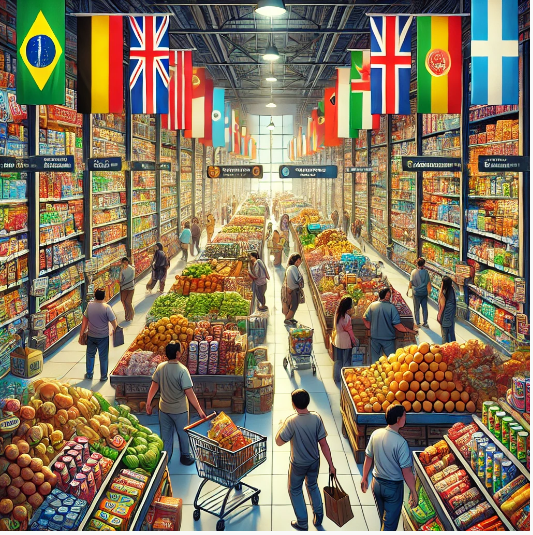In many countries nowadays, consumers can go to a supermarket and buy food produced all over the world. Do you think this is a positive or negative development?
IELTS Cambridge Book 19:
In many countries nowadays, consumers can go to a supermarket and buy food produced all over the world.
Do you think this is a positive or negative development?
The globalization of food production and distribution has led to the remarkable phenomenon where consumers can purchase food from all over the world at their local supermarkets. This development has both positive and negative aspects, but on balance, I believe it represents a positive advancement.
One of the primary benefits of this trend is the increased variety and availability of food products. Consumers are no longer limited to local or seasonal produce; they can enjoy a diverse range of fruits, vegetables, and other food items year-round. This variety not only enhances the culinary experience but also provides nutritional benefits, as people have access to a wider array of vitamins and minerals that may not be present in locally grown foods. For instance, tropical fruits like mangoes and pineapples can be enjoyed in colder regions, contributing to a more balanced diet.
Moreover, the importation of food from different countries supports economic globalization and international trade. Countries can specialize in producing food items that they can grow most efficiently and export them, thus boosting their economies. This interconnectedness can lead to stronger diplomatic relationships and mutual economic growth. For example, countries that produce surplus rice can export it to nations where rice production is less feasible, ensuring food security and economic benefit for both parties.
However, there are also drawbacks to this development. One significant concern is the environmental impact of transporting food across vast distances. The carbon footprint associated with shipping and flying food products internationally contributes to global warming and environmental degradation. Additionally, the reliance on imported food can undermine local agriculture, as small-scale farmers may struggle to compete with cheaper, mass-produced imports. This can lead to the decline of local farming traditions and loss of biodiversity.
Furthermore, the globalization of food supply chains can make them more vulnerable to disruptions. Events such as natural disasters, political conflicts, or pandemics can interrupt the flow of goods, leading to shortages and price increases. The COVID-19 pandemic highlighted this vulnerability, with many countries experiencing disruptions in their food supply chains due to lockdowns and restrictions on movement.
In conclusion, while the ability to buy food from all over the world has significant advantages, such as increased variety and economic benefits, it also poses environmental challenges and risks to local agriculture. On balance, I believe it is a positive development, but it requires careful management and policies to mitigate its negative impacts. Sustainable practices, support for local farmers, and efforts to reduce the environmental footprint of food transportation are essential to ensure that this global food network benefits all.

Комментарии
Отправить комментарий